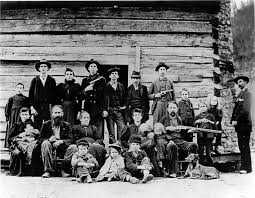Jayne Anne Phillips at Lapham’s Quarterly:
 The so-called Hog Trial took place against a background of bitterness regarding Cline-McCoy loss of land in West Virginia. It’s hard not to recognize the hardships of the postwar decades in the mountains, particularly for the less affluent McCoys, for whom the butchering of a hog could mean the difference between eating or going hungry for some weeks. Fencing the steep land wasn’t practical, and livestock wandered between homesteads; farmers notched the ears of their animals as a form of branding. McCoy saw his notch on Floyd Hatfield’s hog and filed suit. Floyd, Anse’s cousin, lived on the Kentucky side of the river and was related to both families. Some say Randall McCoy’s actual motivation was anger that Floyd worked for Anse’s profitable timber operation. The local justice of the peace, “Preacher Anse” Hatfield, cousin to Devil Anse, impaneled a jury that was half Hatfield men, half McCoy men. McCoy juror Selkirk McCoy—son of Asa Harmon McCoy, the Union soldier murdered thirteen years before—worked, with two of his sons, among the thirty-five to forty men on the Hatfield timber crew. He apparently valued the present more than the past, and voted against Randall McCoy. No violence ensued, but the “betrayal” fueled resentment among the families. McCoy, a subsistence farmer and sometime ferryboat operator, was unable to provide economic stability or social or political status for his clan, while Hatfield’s success protected his family and employees from the economic decline endemic to the Tug Valley. The McCoy family was understandably frustrated, even furious, at the seemingly undefeated Hatfields.
The so-called Hog Trial took place against a background of bitterness regarding Cline-McCoy loss of land in West Virginia. It’s hard not to recognize the hardships of the postwar decades in the mountains, particularly for the less affluent McCoys, for whom the butchering of a hog could mean the difference between eating or going hungry for some weeks. Fencing the steep land wasn’t practical, and livestock wandered between homesteads; farmers notched the ears of their animals as a form of branding. McCoy saw his notch on Floyd Hatfield’s hog and filed suit. Floyd, Anse’s cousin, lived on the Kentucky side of the river and was related to both families. Some say Randall McCoy’s actual motivation was anger that Floyd worked for Anse’s profitable timber operation. The local justice of the peace, “Preacher Anse” Hatfield, cousin to Devil Anse, impaneled a jury that was half Hatfield men, half McCoy men. McCoy juror Selkirk McCoy—son of Asa Harmon McCoy, the Union soldier murdered thirteen years before—worked, with two of his sons, among the thirty-five to forty men on the Hatfield timber crew. He apparently valued the present more than the past, and voted against Randall McCoy. No violence ensued, but the “betrayal” fueled resentment among the families. McCoy, a subsistence farmer and sometime ferryboat operator, was unable to provide economic stability or social or political status for his clan, while Hatfield’s success protected his family and employees from the economic decline endemic to the Tug Valley. The McCoy family was understandably frustrated, even furious, at the seemingly undefeated Hatfields.
more here.
